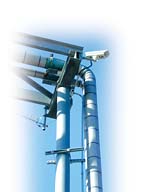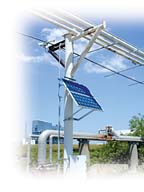Solar Power Drives Security System

The chemical refining plant on the Houston ship channel, with an approximate thousand-acre complex, had deployed security guards on a 24-hour basis to provide security at its dock facility in order to meet the Coast Guard’s new maritime security regulations.
The dock area for this plant is located far from the main complex. There was no electrical power for the camera equipment. After four months of study by the plant engineering and maintenance departments, the estimate for installing just the conduits for both electrical power and the various video signals from the new dock cameras would be $425,000.

The solar power systems consist of a 240-watt solar array for each camera. The arrays and cameras were mounted to existing eight and twelve-inch diameter poles 15 to 25 feet above the ground and were installed with a lift system. The battery and control enclosures were also mounted on the pipes and include theft-resistant locks. The systems use sealed lead-acid batteries designed to last seven years. The batteries operate the security systems for up to ten days with no sun to assure continuous operation of the system regardless of weather conditions. Extensive time was spent assuring breakers, fuses and grounding of the systems were more then adequate to meet the safety and electrical code requirements set by the refinery’s engineers. SSIG installed these systems with a two-person team taking about six to eight hours per site to complete the solar system installation.
Looking for a reprint of this article?
From high-res PDFs to custom plaques, order your copy today!





